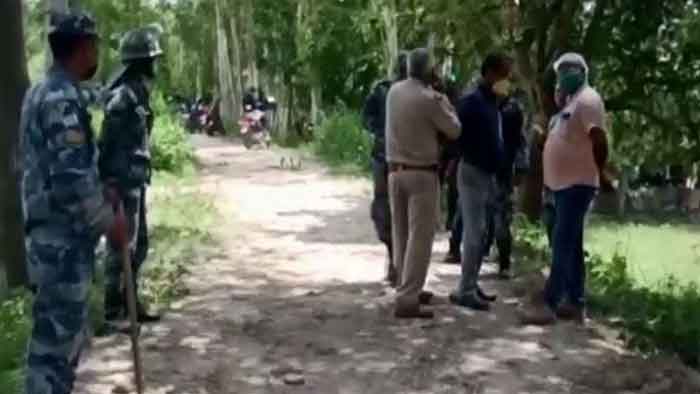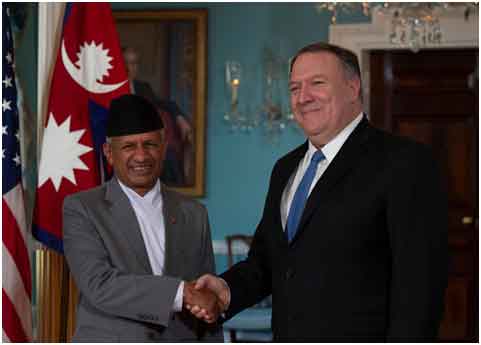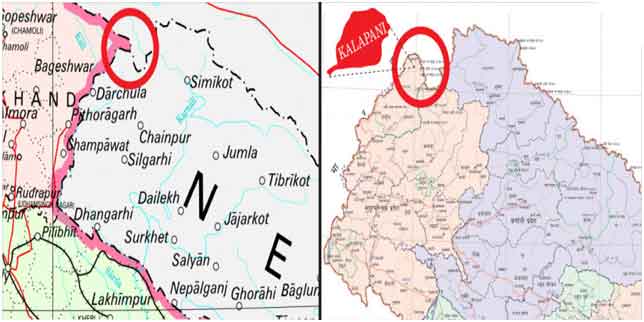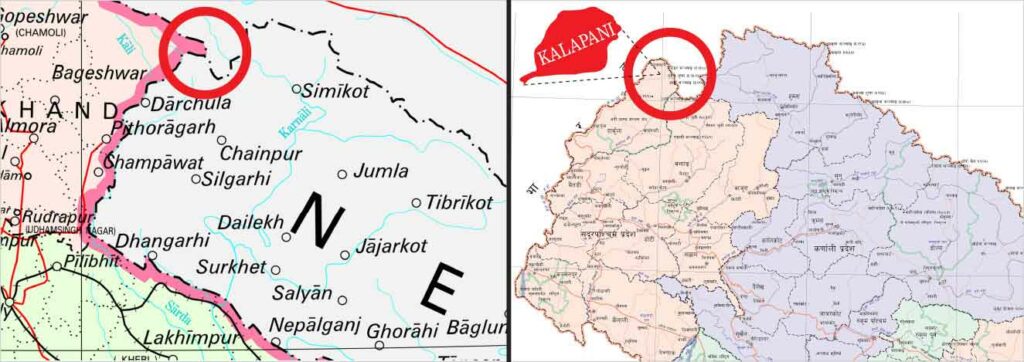(This is Part-1 of a two-part article)
“ We remain committed to resolving the border issue,” said Anurag Srivastava, India’s Official Spokesperson.
“If the coronavirus was an obstacle for negotiations between friendly nations, then we were surprised that it wasn’t an obstacle for this decision (inauguration of the link road). ..This wasn’t the time to create unnecessary controversy which can create unnecessary problems and misunderstandings”: Nepal Foreign Minister
“ China has borders with14 nations, and except for india, it has resolved its disputes with all, including Russia. India has borders with six countries, and excluding Bhutan, it has disputes with all five.”
– Subramanian Swamy, Sinologist, Ex-Union Minister, and BJP MP (Frontline 2000 Sep 2: Sino-Indian Relations Through the Tibet Prism)
*** ***
Nepal strongly objected to the new link road from India to China which was inaugurated by Defence Minister Rajnath Singh on May 8 Friday. In a strongly worded statement, Nepal’s Foreign Ministry said the decision to build the road through territory at the Lipulekh pass that it claims as its territory is a breach of an agreement(2014) reached between the two countries to discuss the matter. (thehindu.com, May 09, 2020. It was a report by Suhasini Haidar, its Foreign Affairs editor.)
On May 8 India inaugurated a strategic link road connecting Dharchula of the Indian State of Uttarakhand and the Tibetan Autonomous Region (TAR) of China via the Lipulekh Pass, in the trijunction of Nepal, China, and India’s Uttarakhand. (See map below.)
On May 9 Saturday, Nepal’s MoFA strongly objected to the construction of the strategic link road by the Indian government.
On the same day, India reacted and claimed that the road construction had taken place within the Indian borders.
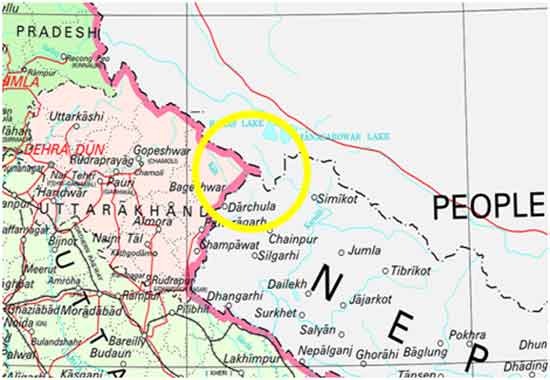
Trijunction of China, Nepal and India’s Uttarakhand, now in the dispute
On May 10 Sunday, Kathmandu had expressed “regret” over India’s “unilateral” decision of constructing a road in a border area that has to be resolved between India and Nepal.
“This unilateral act runs against the understanding reached between the two countries including at the level of prime ministers and that a solution to boundary issues would be sought through negotiation,” Nepal’s Ministry of Foreign Affairs said.
On May 11 Nepal’s Foreign Minister Pradeep Gyawali called in the Indian envoy to Nepal and handed over a diplomatic note in this regard.
India hopes to take up the necessary negotiation on the Kalapani dispute with Nepal after the current global pandemic is tackled successfully, said Indian Ministry of External Affairs (MEA) : both sides were in contact and a mutually convenient date for the Foreign Secretary-level dialogue would be decided to deal with the dispute over the construction of a link road to Tibet.
“The road is in Indian territory. We have an established mechanism for dialogue and both sides are in touch. We are facing COVID-19 crisis and once societies and governments have dealt with the challenges, we will have these talks. We remain committed to resolving the border issue,” said Anurag Srivastava, Official Spokesperson.
The mixed message of territorial claim as well as promise of dialogue came even as Nepal set up an armed border outpost in the westernmost part of the country near the disputed area where India has been carrying on construction of a link road that Nepal has strongly opposed. (The Hindu Special Correspondent , May 14, 2020 )
Army Chief works at cross purposes
Even while the MEA sought to cool the atmosphere, Indian Army Chief General MM Naravane, the very next day, May 15 Friday, accused Nepal of raising the Lipu Lekh issue at the behest of someone else.
Naravane made the statement at a webinar organized by IDSA an Indian think tank. “There is reason to believe that they [Nepal] might have raised this issue at the behest of someone else and that is very much a possibility,”the Indian Express Online quoted the Indian Army Chief as saying.
“As we go ahead there are little issues as to where the tri-junction should be. There have never been any problems on this score in the past.”
There have been such statements, political in nature and impermissible, by Army officials in recent times, on issues that are in the domain of the MEA.
The jingoistic media, across India, played up the Army Chief’s indiscrete statement, and indulged in brazen anti-China frenzy, that someone else was none other than China, wrong in facts and and an indiscretion too.
Social media in Nepal vented ire against the controversial statement calling it India’s hegemonic attitude towards a next door neighbor at the time of a pandemic.
A section of Indian scholars also lambasted the statement made by the Indian Army Chief. Ashok Swain, a scholar of Peace and Conflict Research who is currently teaching at Uppsala University, Sweden, wrote on Twitter “India should start to realize that Nepal is a country and it can have its own opinion! And, Army Chief should stop speaking like a BJP leader.”
In fact, the Army Chief did not bother to check his facts or even the sensitive nature of the issue, more so at this juncture, as is clear from the following:
Unilateral act, and against the agreement between the two countries, says Nepal
“In a strongly worded statement”, as The Hindu May 09, 2020 reported, Nepal disputed India’s claims:
“The Government of Nepal has learnt with regret about the ‘inauguration’ yesterday by India of ‘Link Road’ connecting to Lipulekh, which passes through Nepali territory,” said the statement on May 9 Saturday.
“This unilateral act runs against the understanding reached between the two countries including at the level of Prime Ministers that a solution to boundary issues would be sought through negotiation,” the statement said, referring to the agreement between Prime Minister Narendra Modi and (then) Nepal PM Sushil Koirala in 2014 for Foreign Secretaries to work out the “outstanding boundary issues” on Kalapani (where Lipulekh lies) and Susta.
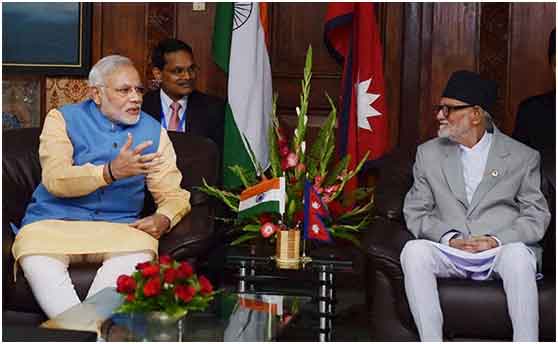
PM Narendra Modi with Nepal’s PM Sushil Koirala meeting in Kathmandu, Nepal in 2014 August 3-4. An Agreement and Joint Statement were then signed.
The said Joint Statement of August 04, 2014, issued after PM Modi paid an official visit to Nepal from August 3-4, 2014, was so explicit that it leaves no scope to mis-interpretation. It reads:
The two Prime Ministers also underlined the need to resolve pending Nepal-India boundary issues once and for all. They welcomed the formation of the Boundary Working Group (BWG) to undertake the construction, restoration and repair of boundary pillars including clearance of ‘Noman’s land’ and other technical tasks. They also welcomed the Joint Commission’s decision to direct the Foreign Secretaries to work on the outstanding boundary issues, including Kalapani and Susta receiving required technical inputs from the BWG as necessary. The Indian side stressed on early signing of the agreed and initialed strip maps of about 98% of the boundary. The Nepalese side expressed its desire to resolve all outstanding boundary issues. (Point No. 12 of the Joint Statement)
Thus the Army Chief was obviously caught on the wrong foot, apart from his indiscretion, and violation of norms to keep away from public statements.
In fact, his statement is self-contradictory: “ there are little issues as to where the tri-junction should be,” he said. It is an admission of a border dispute.
“There have never been any problems on this score in the past,” he said. Obviously it is off the mark as the Joint Statement of August 2014 shows : “They (the two PMs) also welcomed the Joint Commission’s decision to direct the Foreign Secretaries to work on the outstanding boundary issues, including Kalapani and Susta. It is these areas that are now at the Centre of controversy.
Even though the MEA asserted ,“The road is in Indian territory,” Srivastava assured: “We remain committed to resolving the border issue.” India hopes to take up the necessary negotiation on the Kalapani dispute with Nepal after the current global pandemic is tackled successfully, he said only the previous day. Thus he is working at cross purposes, vitiating the diplomatic moves.
In fact the MEA specifically said: “both sides were in contact and a mutually convenient date for the Foreign Secretary-level dialogue would be decided to deal with the dispute over the construction of a link road to Tibet….” after the Covid-19 crisis is handled.
China cautions both against unilateral action
In fact, China did not use the occasion to blame India, or to fish in troubled waters:
Responding to a question from a journalist during a regular press conference in Beijing on May 19 Tuesday, Chinese Foreign Ministry Spokesperson Zhao Lijian said the outstanding border issues in Kalapani, Lipu Lekh and Limpiyadhura are issues between Nepal and India. “The issue of the Kalapani region is a problem between Nepal and India,” said Zhao.
While recognizing that border issues exist in the whole of Kalapani, Lipu Lekh and Limpiyadhura between India and Nepal, Zhao has also urged the two countries to settle their disputes through friendly consultations. “We hope that the two countries will properly resolve their differences through friendly consultations and will not take any unilateral action that may complicate the situation,” Zhao said.
“To attribute anything between Nepal and India to a China factor is completely wrong” : Nepal’s Foreign Minister
indiatoday.in May 14, 2020 reported:
Nepal rubbished reports that it was influenced by China in the strong protest that it lodged against India for the Link Road construction…Speaking exclusively to India Today TV from Kathmandu, Nepal’s Foreign Minister Pradeep Gyawali said:
“Nepal would never allow any sort of interference in its internal matters. We have good relations with China that’s true, but that does not mean Nepal picks a side. Nepal always pursued neutral foreign policy. We have good relations with two foreign neighbours. So, to attribute anything between Nepal and India to a China factor is completely wrong.”
Taking a jibe at the Indian media that reported on the ‘China factor’ and an increasing Chinese influence on Kathmandu, the minister said, “It’s quite popular in a certain section of Indian media and intellectual society. Nepal knows that it has two neighbours. We never compare our relations with our neighbours or friends. Our relation with India is very comprehensive in the way it is built. It is deep-rooted in history and nurtured by shared culture and people to people relations. We also have good relations with China.”
Pradeep Gyawali said that this “unilateral” decision of India went against the prior “understanding” between the two nations.
Nepal has been raising this issue since long
In fact, Nepal did not raise this issue now, after India inaugurated the strategic link road. It has been raising this border dispute since long.
“Nepal has been again and again trying to organise that meeting. So that’s how the problem has occurred. When India updated its political map in November 2019, immediately after that Nepal clearly expressed its concerns, its objections and tried time and again to organise that mechanism be implemented. But not having a single meeting on the proposed dates by Nepal and the inauguration of the link road has created a big concern in Nepal and that is why we have objected and requested India to refrain from any such activities which go against the prior understanding on that part of the boundary issue (which) should be resolved through diplomatic negotiations”, he said.
“The timing of the decision by India during the coronavirus pandemic is really surprising. It was not expected because when we proposed the possible dates for negotiations, India didn’t respond…
The two sides had decided to set up foreign secretary-level talks to resolve the dispute which is yet to take place.
To a question on proposed dates for talks and when can it take place given the coronavirus pandemic, the minister quipped, “If the coronavirus was an obstacle for negotiations between friendly nations, then we were surprised that it wasn’t an obstacle for this decision (inauguration of the link road).
“This wasn’t the time to create unnecessary controversy which can create unnecessary problems and misunderstandings.”
SIGN UP FOR COUNTERCURRENTS DAILY NEWS LETTER

